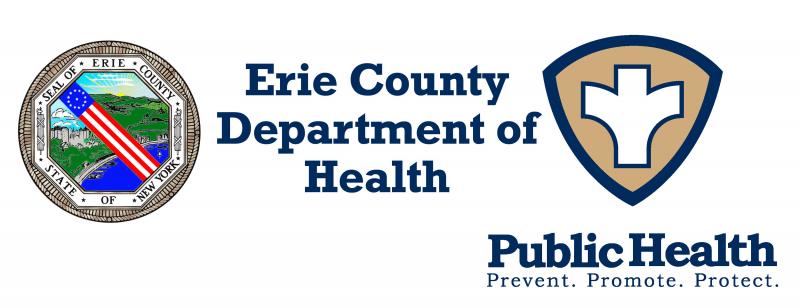Modified: June 24, 2016 1:08pm
Latest News

PRESS RELEASE
From the Office of the Commissioner of Health, Dr. Gale R. Burstein
Date June 24, 2016
CONTACT: Mary C. St. Mary/Mary.StMary@Erie.Gov
Phone: 716.858.4941/ Mobile: 716.253.3925
Rash of Rabid Animals in Erie County
Rabid Cat & Rabid Fox Expose Numerous Residents to Rabies Virus
ERIE COUNTY, NY—Just this week, a fox was found in Eden and a pet cat in the town of Aurora; both tested positive for rabies. Exposure to these animals has necessitated that several individuals receive Rabies Post Exposure Prophylaxis (“PEP”), which is a series of five injections, including four that must be administered intramuscularly, given over a two week span.
“Rabies remains a very serious disease; nearly always fatal once symptoms are evident,” stated Dr. Gale R. Burstein, Erie County Commissioner of Health. “Everyone should always remain cautious around wildlife or domestic animals. No one can know if an animal has rabies just by its appearance. Rabid animals’ behavior can range from normal to lethargic, aggressive, or overly friendly. Already in 2016 we have investigated 1,185 incidents for possible rabies exposure. From those encounters, 116 people are now undergoing rabies PEP.
It is equally important that “indoor” or “indoor/outdoor” cats are vaccinated against rabies. It is difficult to ensure that any cat will be completely free of rabies exposures. Bats, which have a high incidence of rabies, commonly find their way into homes through small openings. Raccoons can find ways inside buildings in a search for food. In addition, an “indoor-only” cat may sneak outdoors through an open window or door.
“Although the majority of the rabid animals we see in Erie County are wildlife, your pets can be at risk of infection if they come in contact with a rabid animal and are not vaccinated,” said Peter Tripi, Senior Public Health Sanitarian. “Unfortunately, we identified a cat recently that was not vaccinated against rabies that became infected. The cat subsequently attacked members of the household, exposing them to rabies. If you love your pets, please take advantage of our free clinics to ensure that all your pets, including both “outdoor” or “indoor” cats, are vaccinated against the rabies virus.”
In addition, handling abandoned raccoon and fox pups can lead to rabies virus exposures. Recently, 17 individuals recently handled and delivered an injured fox to the SPCA. A few days later the injured fox began to exhibit rabies symptoms and subsequently tested positive for the deadly virus. Those individuals must now undergo the rabies PEP protocol.
How to Protect against Rabies
•Do not feed, touch or adopt wild animals, stray dogs or cats. Assume all wildlife & feral animals are rabid.
•Be sure your pet dogs, cats and ferrets and horses and valuable livestock animals are up-to-date on their rabies vaccinations. Vaccination protects pets if they are exposed to rabid animals. Pets too young to be vaccinated should be kept indoors and allowed outside only under direct observation.
•Keep family pets indoors at night. Do not leave them outside unattended or let them roam free.
•Do not attract wild animals to your home or yard. Keep your property free of stored bird seed or other foods that may attract wild animals. Feed pets indoors. Tightly cap or put away garbage cans. Board up any openings to your attic, basement, porch or garage. Cap your chimney with screens.
•If nuisance wild animals are living in parts of your home, consult with a nuisance wildlife control expert about having them removed.
•Teach children not to touch any animal they do not know and to tell an adult immediately if they are bitten or scratched by any animal.
•If a wild animal is on your property, let it wander away. Bring children and pets indoors and alert neighbors who are outside.
Report all animal bites or contact with wild animals:
ECDOH Vector Control
716.961.6800 M-F Business Hours
716.961.7898 Evenings/Weekends
No one wants to see an injured animal on the road or abandoned pups or kittens without offering assistance. However, what may seem like a compassionate gesture could put you and your family in danger. Please report wildlife encounters to an appropriate agency like the New York State Department of Environmental Conservation (“DEC”), the SPCA’s Wildlife Department, or a DEC-licensed wildlife trapper who can provide guidance.
If you come in contact with wildlife, please contact ECDOH immediately to determine the likelihood of rabies exposure and risk of infection. Wildlife are NOT pets and should not be treated as such. Rabies is common throughout New York State and in Erie County wildlife.
The brain is used to test animals for rabies, which requires the animal to be euthanized. Alternatively, if a pet with an unknown or unvaccinated rabies vaccine status bites a person, to avoid rabies testing, the animal must be confined and observed for ten days at the owner’s expense. A six-month quarantine is required when an animal comes in contact with a confirmed or suspected rabid animal. Vaccinating our pets with rabies vaccine not only protects them, but also can protect family and friends from rabies exposure and the need for the PEP immunizations.
Three free rabies vaccination clinics are scheduled across Erie County in September:
Wednesday, Sept. 14th ECC-North Campus
Tuesday, Sept. 20th Springville Vol. Fire Dep’t.
Wednesday, Sept. 28th West Seneca Highway Garage
All clinics are from 4-7pm. For specific location details, please visit our website at: http://tinyurl.com/rabiesclinics
# # #
For More Information:
Erie County Department of Health
New York State Department of Health
New York State Department of Health—Rabies fact sheet
Centers for Disease Control and Prevention

